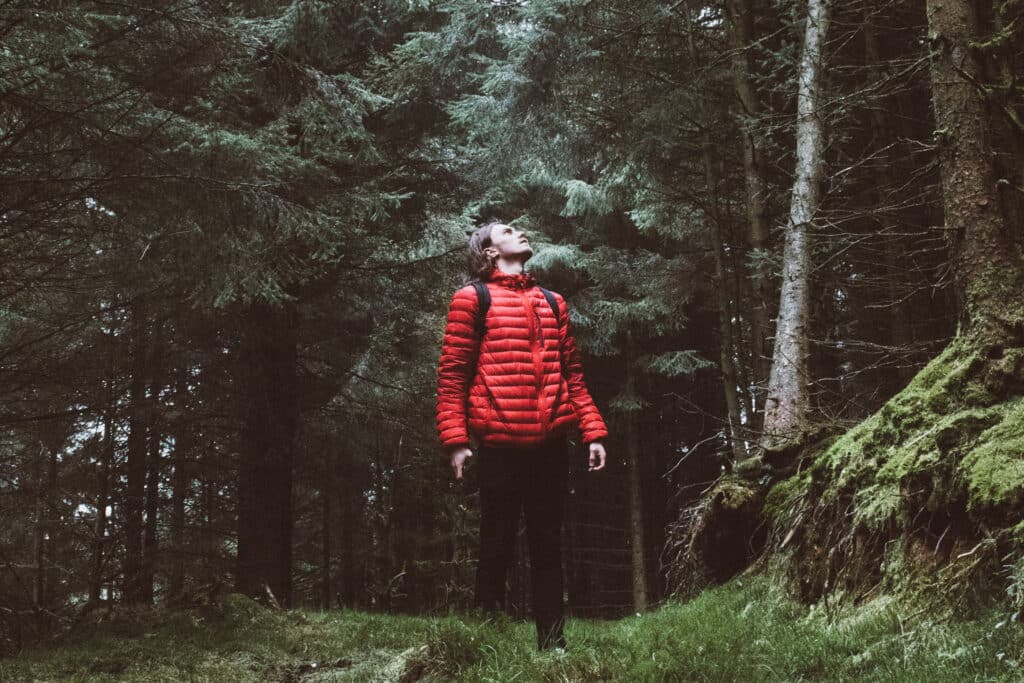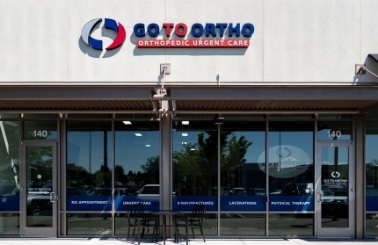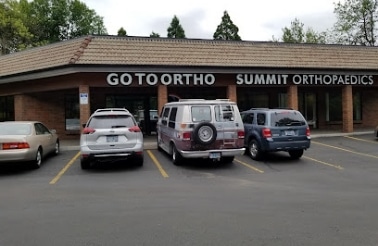Each year record numbers of people are flocking into Oregon parks and wilderness to enjoy nature. While therapeutic, escaping the city can reduce access to life saving medicine, due to Oregon’s limited trauma and injury support system in rural areas. In fact, your risk of fatality increases nearly 50 percent if seriously injured outside of a major metropolitan area, and accidents are more common than you think. Take Kathryn, for example.
When Kathryn Carter saw the picturesque dead fallen tree just off the trail, she knew it was the perfect place for a #hikingadventures photo. The former gymnast left her golden retriever waiting by the base of the tree and easily climbed into its branches, carefully tested a large branch for safety, and leaned against it, iPhone in hand to snap a pic.
Suddenly, the dead branch broke and Kathryn tumbled eight feet onto the trunk of the fallen tree. “I was laying on this dead tree, with a sharp branch pressed against the side of my neck. … I was sure there would be blood gushing everywhere.” Luckily, the branch hadn’t pierced her skin. Although covered in cuts and scrapes, she was able to limp out of the forest with only a sprained ankle.
This is just one example of what can happen when enthusiasts take to the outdoors. Thankfully, she always hiked with first aid supplies, snacks, and water and an ankle brace; most do not. (Before you head out for your own #hikingadventure, check out our list of Eight Unexpected Items Doctors Recommend You Take in Your Backpack.)
“The highest accident mortality rates in the country are in rural states like Oregon. So this is the challenge from a public health standpoint to try and reverse this and give people a chance who are injured in a rural car accident, farming accident or in the wilderness,” said Dr. Bill Long, co-chair of Oregon Trauma Education Foundation. “Lack of cell phone coverage, inability of medical response teams to get to remote places quickly, and limited trauma training for medical personnel in rural areas all affect how quickly one can get the care needed.”
In Oregon’s mountains and countryside, it’s easy to forget how isolated you are. Treacherous terrain on the coast can slow ambulances. Remote trails may only be accessed by helicopter, which takes time to dispatch and find a location. Even on popular hiking trails that are a short jaunt from popular tourist towns, medical response teams may not be able to quickly get medical equipment up the trail. You’re on your own until help can find you.
Rural Oregon Hospitals and Trauma
If you’ve had an accident in the wilderness and help has arrived – that doesn’t mean your ordeal is over. The fact is, many rural Oregon hospitals are not equipped to deal with traumatic injuries. Appendectomies may be routine at hospitals in rural Oregon, but traumatic injuries in which a patient’s life hangs in the balance are not.
The orthopedic surgeons at Go To Ortho are not just experts in trauma care, they are the on-call trauma surgeons for Legacy Emanuel Hospital and are active in the Oregon Trauma Research and Education Foundation (OTREF), a nonprofit dedicated to addressing the need for additional resources and trauma care training for first responders and rural Oregon hospitals.
The OTREF works to improve trauma education and training at rural hospitals so patients can get the life and limb saving measures they need immediately. The foundation has set in place a system that dramatically improves chances for those who are injured in rural areas. The OTREF continues to raise money so that rural hospitals, surgeons, nurses and emergency medical services personnel can learn and practice critical trauma procedures to stop bleeding and to work together as a team to save lives. This year, Dr. Steven Madey, cofounder of Go To Ortho, is the co-chair of the OTREF annual gala to raise money for training.
The Go To Ortho surgeons, working through Trauma Specialists, have all provided emergency trauma services to patients who have had accidents in remote areas. Sometimes they have provided advice over the phone or have traveled to rural hospitals to perform a surgery.
Dr. Madey wants to help raise awareness about the reality of trauma care in rural Oregon. “Most people don’t know about this issue. We want people to know that planning ahead for an accident is important – it’s not like getting hurt in Portland, Eugene or Corvallis. You can’t be rushed to the ER and have a top notch team of orthopedic surgeons on site to do your emergency surgery. Rural hospitals are doing the very best they can with limited resources.”
Getting outdoors? First check out our list of Eight Unexpected Items Doctors Recommend You Take in Your Backpack.




